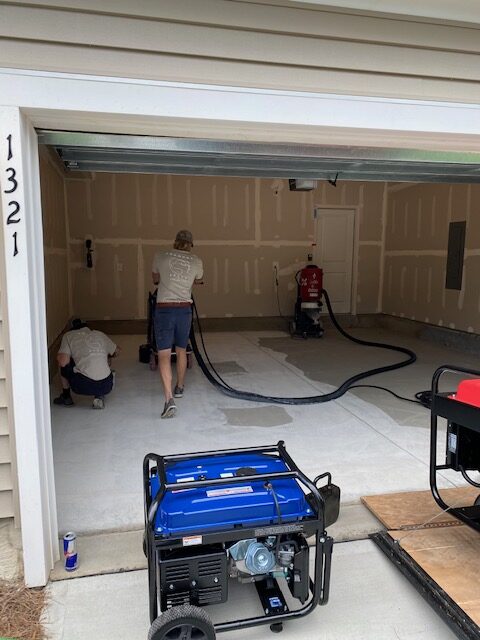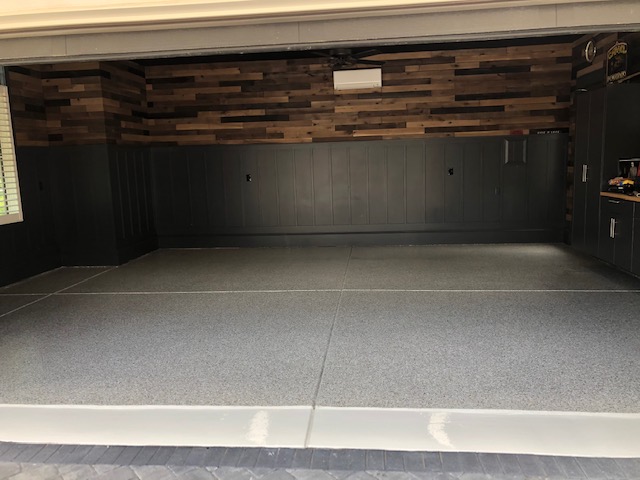Introduction
Epoxy floors have gained popularity in recent years due to their durability, aesthetic appeal, and ease of maintenance. Whether you have an epoxy garage floor or another epoxy-coated surface, taking proper care of it is essential to ensure its longevity. In this article, we’ll explore the key aspects of maintaining and cleaning epoxy floors, with a primary focus on “Caring for an Epoxy Garage Floor.”
Benefits of Epoxy Flooring
Before we dive into maintenance tips, it’s important to understand why epoxy flooring is a popular choice. Epoxy floors offer several benefits, including:
1. Durability and Longevity: Epoxy coatings are known for their toughness, making them ideal for high-traffic areas.
2. Aesthetic Appeal: Epoxy floors come in various colors and designs, allowing you to customize your space.
3. Easy Maintenance: Proper care can keep your epoxy floor looking great for years.
Understanding Epoxy Floor Composition
Epoxy floors differ from traditional flooring materials due to their unique composition. They are created by mixing epoxy resin with a hardening agent. Once applied, epoxy creates a smooth, shiny, and seamless surface that is not only visually appealing but also highly resilient.
Regular Cleaning and Maintenance
Keeping your epoxy floor clean is crucial to preserving its appearance and durability. Regular cleaning involves:
1. The Basics of Cleaning Epoxy Floors: Sweep or dust mop your floor regularly to remove dirt and debris. This prevents scratches and maintains the floor’s shine.
2. Recommended Cleaning Products: Use a pH-neutral cleaner and a soft mop or cloth to clean the floor. Avoid harsh chemicals that can damage the epoxy coating.
3. Frequency of Cleaning: Aim to clean your epoxy floor at least once a week, or more frequently in high-traffic areas.
Preventative Measures
Preventing damage to your epoxy floor is as important as cleaning it. Here are some preventative measures to consider:
1. How to Avoid Damage to Epoxy Floors: Place doormats at entryways to trap dirt and prevent it from being tracked onto the floor. Use furniture pads to protect against scratches.
2. Protective Strategies: Consider using area rugs in high-traffic zones, and encourage a “no-shoes” policy in your home to reduce wear and tear.

Addressing Common Issues
Despite your best efforts, epoxy floors may encounter common issues such as stains, scratches, and dullness. Here’s how to address them:
1. Stains and Spills: Wipe up spills immediately to prevent staining. For stubborn stains, use a mild vinegar solution.
2. Scratches and Scuffs: Light scratches can often be buffed out with a soft cloth and a bit of elbow grease. For deeper scratches, consider professional repair.
3. Dullness and Wear: Over time, epoxy floors may lose some of their shine. This can be restored through periodic resealing or waxing.
4. DIY vs. Professional Maintenance: Making the Right Choice
When it comes to maintaining your epoxy floors, one of the critical decisions you’ll face is whether to handle the maintenance yourself (Do-It-Yourself or DIY) or enlist the services of professionals. The choice between these two options largely depends on the scale of the maintenance job at hand.
1. DIY Maintenance:
Regular Cleaning:
DIY maintenance is well-suited for routine tasks such as regular cleaning. Sweeping or dust mopping your epoxy floor to remove dirt and debris can be easily managed by homeowners. These simple cleaning routines not only keep your floor looking great but also enhance its longevity.
Minor Scratch Repairs:
Small scratches or scuffs that occasionally occur can often be addressed as DIY projects. With the right tools and a bit of care, you can gently buff out minor imperfections and restore the floor’s shine. DIY scratch repairs are cost-effective and can be accomplished without the need for professional intervention.
However, it’s essential to be aware of your limitations and recognize when a maintenance task might be beyond your expertise.
2. Professional Maintenance:
Larger Issues:
When dealing with more substantial issues, professional maintenance is highly recommended. These larger problems might include deep scratches, extensive damage, or issues that affect the structural integrity of your epoxy floor.
Resealing and Waxing:
Periodic resealing or waxing, which helps maintain the shine and durability of your epoxy floor, is best handled by professionals. They have the expertise and equipment to perform these tasks efficiently and effectively.
Preventative Maintenance:
Professionals can also provide comprehensive preventative maintenance services, which can go a long way in extending the life of your epoxy floors. Preventing issues before they become significant problems is often more cost-effective than waiting for extensive damage to occur.
Why Choose Professional Maintenance:
Professional maintenance offers several advantages, including:
Expertise:
Professionals have in-depth knowledge and experience working with epoxy floors. They understand the nuances of the material and can identify and address issues effectively.
Efficiency:
Professional maintenance is often faster and more efficient. They can complete tasks quickly, minimizing disruption to your daily routine.
Quality Assurance:
When you hire professionals, you can expect high-quality results. Their work is typically backed by guarantees, giving you peace of mind.
DIY and professional maintenance ultimately depends on the complexity and scale of the maintenance task.
While smaller tasks like regular cleaning and minor scratch repairs are well-suited for DIY efforts, larger issues and preventative maintenance are best left in the capable hands of professionals. Choosing the right approach ensures the best results, preserves the longevity of your epoxy floors, and minimizes the risk of potential mistakes.
Location Matters: Tips for Different Areas
If you’re in one of the areas such as Charlotte, Matthews, Fort Mill, Pineville, Lake Norman, Davidson, Huntersville, Concord, or Cornelius, the local environment can impact your epoxy floor. Tailor your maintenance to address specific challenges, such as humidity, temperature fluctuations, or exposure to outdoor elements.
The Long-Term Perspective
Taking care of your epoxy floor isn’t just about preserving its beauty; it’s also a smart investment. By following these maintenance tips, you can extend the life of your epoxy floors and save on repair costs down the road.
Conclusion
In conclusion, maintaining and cleaning your epoxy floors is essential for their longevity and aesthetic appeal. Whether you have an epoxy garage floor or another epoxy-coated surface, regular cleaning, preventative measures, and addressing common issues will keep your floors looking great for years to come.
At Dogwood, we understand the importance of caring for epoxy floors. If you are looking for someone to help you with your epoxy floor maintenance needs in the Charlotte, Matthews, Fort Mill, Pineville, Lake Norman, Davidson, Huntersville, Concord, or Cornelius areas, we are here to assist you. Our services include Garage Epoxy Flooring, Epoxy Patios, Commercial Epoxy Floors, Showroom Floors, and Epoxy Porch Coatings. Feel free to reach out for expert guidance and assistance in maintaining your epoxy floors. We’re here to help you enjoy the benefits of your epoxy floors for years to come.
FAQs
1. How do you clean and maintain epoxy floors?
To clean and maintain epoxy floors, follow these steps:
Regular Sweeping: Use a soft-bristle broom or dust mop to remove dust, dirt, and debris from the surface regularly. This prevents scratches and keeps the floor clean.
Mop with Warm Water: For routine cleaning, mop the floor with warm water and a pH-neutral cleaner. Avoid using harsh chemicals or abrasive cleaning agents, as they can damage the epoxy.
Stain Removal: If spills occur, clean them promptly to prevent staining. Use a soft cloth or mop with warm, soapy water or a mixture of water and white vinegar.
Avoid Harsh Chemicals: Avoid using acidic or harsh chemicals, such as ammonia, citrus-based cleaners, or vinegar, as they can dull the epoxy’s shine.
Protect the Floor: Place mats at entrances to trap dirt and prevent it from being tracked onto the epoxy floor. Consider using furniture pads to protect against scratches from heavy objects.
Periodic Deep Cleaning: For more thorough cleaning, you can use an epoxy-specific floor cleaner or a diluted ammonia solution. Follow the manufacturer’s recommendations for cleaning products.
2. How do you maintain epoxy floor coating?
To maintain the appearance and performance of an epoxy floor coating, follow these tips:
Avoid Heavy Impact: Be cautious with heavy objects and machinery, as dropping or dragging heavy items can chip or damage the epoxy coating.
Prevent Scratches: Use furniture pads and be careful when moving furniture or equipment to avoid scratching the epoxy surface.
Regular Cleaning: As mentioned earlier, routine cleaning is essential to remove dirt and prevent stains. Use a soft mop and a pH-neutral cleaner for this purpose.
Reapply Sealant: Epoxy coatings may require resealing every few years, depending on the level of wear and exposure. Consult with the coating manufacturer for specific recommendations.
Address Cracks or Damage: If you notice cracks or damage in the epoxy, repair them promptly to prevent further deterioration. Consult a professional for proper repair and maintenance.
3. What is the life expectancy of epoxy flooring?
The life expectancy of epoxy flooring depends on several factors, including the quality of the installation, the level of use and abuse, and the maintenance practices. In general, well-installed and properly maintained epoxy flooring can last for 10 to 20 years or more.
High-traffic commercial or industrial settings may experience more wear and require more frequent maintenance and resealing. On the other hand, residential epoxy floors may have a longer lifespan due to lighter use.
The specific epoxy product, the preparation of the substrate, and the quality of the installation are crucial factors in determining the longevity of the flooring.
4. What is the best thing to clean epoxy floors?
The best thing to clean epoxy floors is warm water and a pH-neutral cleaner. You can use a mild dishwashing detergent or a commercial epoxy-specific floor cleaner. These cleaners are gentle on the epoxy surface and won’t damage its finish. Avoid using harsh chemicals, acidic cleaners, or abrasive cleaning agents, as they can dull or damage the epoxy coating.
5. How do you keep epoxy floors shiny?
To keep epoxy floors shiny, follow these maintenance tips:
Regular Cleaning: Routine cleaning with warm water and a pH-neutral cleaner will help maintain the shine and cleanliness of the epoxy floor.
Resealing: Depending on the level of wear and exposure, epoxy floors may require resealing every few years. Consult the manufacturer’s recommendations and hire a professional if needed.
Waxing: In some cases, you can apply a wax or floor finish designed for epoxy floors to enhance the shine. Be sure to follow the manufacturer’s instructions for application.
Prevent Scratches: Use furniture pads and take care when moving heavy objects to prevent scratches, which can dull the shine.
Mats and Rugs: Place mats or rugs at entrances to trap dirt and prevent it from being tracked onto the floor. This can help preserve the shine and reduce the need for cleaning.
With proper cleaning and maintenance, epoxy floors can maintain their shine and durability for many years.

